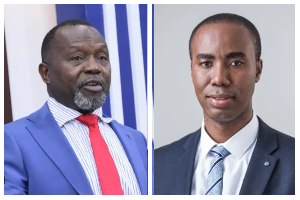By Kwame Okoampa-Ahoofe, Jr., Ph.D.
Early this week (1/11/10), President John Evans Atta-Mills inaugurated a 9-member Constitutional Review Commission (CRC) charged with making relevant suggestions and recommendations to the Ghanaian president for possible implementation in the offing.
Indeed, it can hardly be gainsaid that after 18 years of field operation, Ghana’s 1992 Republican/Democratic Constitution may well be due for a critical reexamination and operational streamlining or overhaul. Many critics among members of the general public, for example, have in recent years vehemently inveighed against what they term as the “unconstitutionality” of several salient aspects of the Fourth-Republican Constitution, especially with regard to the so-called Indemnity Clause which has enabled such “giant” political criminals like Mr. Jeremiah John Rawlings to legitimize his criminality into “revolutionary acts of probity and accountability” and thus also permissible acts which lie well beyond justiciable acts pertaining to human rights violation. Consequently, it would be quite intriguing to witness what the commission returns, by way of a verdict in between 12 to 18 months hence.
What makes the entire process eerily suspect, obviously, regards the way and manner in which the President went about it. For instance, one would have expected the tabling of a constitutional review bill in Ghana’s parliament, followed by extensive bi-partisan debate, as befits a functionally respectable democratic culture, followed, again, by the Parliamentary Judicial Committee (if, indeed, any such apparatus really exists) being charged by the Full-House with the setting up of a Constitutional Review Committee.
As it stands, it appears as if President Atta-Mills gloats in riding roughshod over the legislative branch of the central government. Ironically, though, it is precisely such patently undemocratic – to speak much less about autocratic – behavior that imperatively necessitates a constitutional review.
There is also something sneaky about the entire process, coming right in the wake of the Attorney-General’s vehement public agitation for the tenure of the presidency to be extended by at least 12 months. And here, it goes without saying that in the miserable and vengeful political culture such as shamelessly and doggedly pursued by the National Democratic Congress (NDC), any injudicious attempt to prolong the government’s executive mandate is almost certain to bring the country to the brink of anomie and outright chaos.
Indeed, twenty years of unremitting tyranny ought to have taught the Ghanaian electorate something much, much better than this glaringly stolid blunder of returning the extortionate Provisional National Democratic Congress (P/NDC) to power.
At any rate, we must be honest enough to recall for the benefit of those of our readers who might have so soon forgotten that, indeed, the injudicious possibility of extending Ghana’s presidential tenure was first mooted by former President John Agyekum (Kofi Diawuo) Kufuor. It was shortly after the latter had been invited to a sumptuous dinner (we learned) by then-President Olusegun Obasanjo of Nigeria. Back then, this writer demanded to know what Mr. Obasanjo had fed his Ghanaian opposite number, which curiously appeared to have so whetted Mr. Kufuor’s appetite for unsavory political entrenchment.
I never got an answer from Old-Sleepy-Eyes (a.k.a. Manhyia Street Toughie) back then; but it fearfully appears that his tacit darlings on the other side of the parliamentary aisle and executive divide heard Uncle Kofi Diawuo loud and clear, as it were. And what is more, Mrs. Betty Mould Iddrisu, the Attorney-General, and her paymasters appear dangerously determined to have their way by hook or crook or both, of course.
Needless to say, the way things are going, the work of the Constitutional Commission, chaired by Prof. Albert Fiadjoe, is almost certain to come to naught unless, of course, matters are promptly referred to Parliament for debate and also tabled at the polls – in the form of a referendum – for the Ghanaian people, as a whole, to decide.
*Kwame Okoampa-Ahoofe, Jr., Ph.D., is Associate Professor of English, Journalism and Creative Writing at Nassau Community College of the State University of New York, Garden City. He is a Governing Board Member of the Accra-based Danquah Institute (DI), the pro-democracy think tank, and the author of 21 books, including “Ghanaian Politics” (Atumpan Publications/Lulu.com, 2008). E-mail: okoampaahoofe@aol.com. ###
Opinions of Wednesday, 13 January 2010
Columnist: Okoampa-Ahoofe, Kwame
Constitutional Review Process Is Flawed
Entertainment













